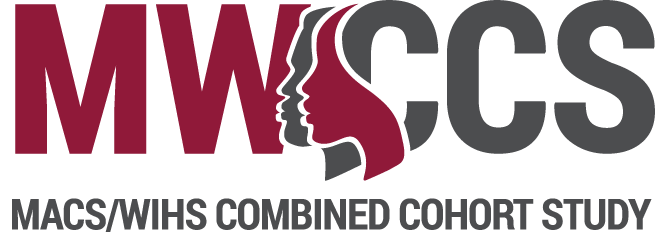Participants
As of March 2025, there are 5,811 people enrolled in the MWCCS. This includes 3,544 former MACS and WIHS participants as well as 2,267 new participants (1,529 people living with HIV (PLWH) and 738 people living without HIV (PLWoH)). 82% of living participants active in the 4 years before the merge enrolled in MWCCS. All MWCCS participants are followed with an annual, protocol‐driven visit and intermediate in‐person and phone contacts, including substantial outcomes ascertainment.
Study Aims
Cardiovascular Aims: To identify novel behavioral and HIV-related risk factors associated with: a) fatal and incident hospitalized nonfatal CVD events; and b) development and progression of subclinical cardiac structural and functional abnormalities.
Pulmonary/Sleep Aims: To identify novel risk factors, biomarkers, and the influence of HIV infection on lung function trajectory, pulmonary exacerbations, respiratory symptoms, sleep quality, and habitual sleep duration.
Neurocognitive Aims: To: a) describe the pattern and profile of cognitive impairment and their associated risk factors and risk modifiers; and b) determine alterations in MRI-measured brain structure and their association with cognitive function.
Aging Aims: To investigate: a) longitudinal changes in physical function and factors influencing these changes; b) the incidence of geriatric conditions, including multimorbidity, and factors influencing these conditions; c) molecular and biochemical markers of aging; and d) the biology of healthy or successful aging.
Cancer Aims: To determine: a) the incidence of, and risk factors associated with, AIDS and non-AIDS related malignancies; and b) factors (e.g., psychosocial, behavioral, cancer treatment, HIV-related, and comorbidities) associated with cancer survivorship.
HIV Pathogenesis Aims: To evaluate factors influencing HIV persistence and the long-term latent viral reservoir in blood and tissues of a subset of well-matched ART-treated men and women living with HIV who have long-term plasma viral load suppression. We will evaluate the size of the HIV viral reservoir by sex and anatomical location and its relationship with: a) immune cell phenotypes; b) the degree of clonal expansion of latently infected CD4 T cells, and c) the microbiome and antiretroviral drug exposure.
Psychosocial Aims: To examine: a) trajectories of vulnerabilities and resiliencies and their relationship to HIV outcomes and comorbidities; and b) mechanisms by which psychosocial/behavioral and structural predictors affect health outcomes.
Health Disparities Aims: By expanding enrollment to men in the Southeast and PLWH elsewhere who are representative of the U.S. epidemic, we will: a) evaluate the effect of personal (e.g., race, sex, education, income) and neighborhood-level characteristics (e.g., census tract-level poverty, county-level income inequality) on achieving prevention and treatment targets for comorbidity outcomes among people with and at higher risk for HIV infection; and b) refine methods for estimating differences in achieving health guideline targets to reduce the incidence of MI and stroke, lung cancer, and all-cause and cause-specific mortality.
Platform Aims: To serve as a reliable, valid, and standardized platform for collaborative and independently funded research with investigators within the MWCCS and external to the MWCCS by: a) continuing collection of fresh specimens (blood, urine, oral, stool, cervicovaginal lavage, hair and tissue for tumor and reservoir studies) and measuring clinical, immunologic and virologic markers; b) expanding assessments of comorbid conditions and adjudicated clinical outcomes (e.g., cardiovascular, renal, and liver disease, cancer, and death); and c) developing a MWCCS omics platform (e.g., genome, microbiome).
Career Development Aims: To foster the development of early career investigators and students interested in HIV research and to engage early established investigators not currently conducting HIV-related research in innovative HIV-related studies leveraging the platform of the MWCCS.
Click here for a list of acronyms and abbreviations that may aid in your understanding of the cohort.
Click here to view a calendar of upcoming scientific conferences.

